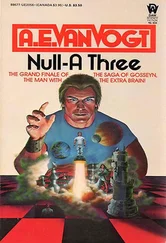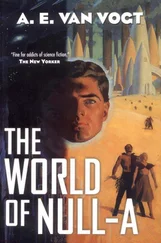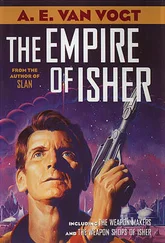Alfred van Vogt - The Players of Null-A
Здесь есть возможность читать онлайн «Alfred van Vogt - The Players of Null-A» весь текст электронной книги совершенно бесплатно (целиком полную версию без сокращений). В некоторых случаях можно слушать аудио, скачать через торрент в формате fb2 и присутствует краткое содержание. Жанр: Фантастика и фэнтези, на английском языке. Описание произведения, (предисловие) а так же отзывы посетителей доступны на портале библиотеки ЛибКат.
- Название:The Players of Null-A
- Автор:
- Жанр:
- Год:неизвестен
- ISBN:нет данных
- Рейтинг книги:3 / 5. Голосов: 1
-
Избранное:Добавить в избранное
- Отзывы:
-
Ваша оценка:
- 60
- 1
- 2
- 3
- 4
- 5
The Players of Null-A: краткое содержание, описание и аннотация
Предлагаем к чтению аннотацию, описание, краткое содержание или предисловие (зависит от того, что написал сам автор книги «The Players of Null-A»). Если вы не нашли необходимую информацию о книге — напишите в комментариях, мы постараемся отыскать её.
The Players of Null-A — читать онлайн бесплатно полную книгу (весь текст) целиком
Ниже представлен текст книги, разбитый по страницам. Система сохранения места последней прочитанной страницы, позволяет с удобством читать онлайн бесплатно книгу «The Players of Null-A», без необходимости каждый раз заново искать на чём Вы остановились. Поставьте закладку, и сможете в любой момент перейти на страницу, на которой закончили чтение.
Интервал:
Закладка:
He waited till Nirene was out of the apartment, and then called Madrisol of the League on the videophone.
He waited tensely while the call was put through. For this could be interpreted as treason. He had asked Enro for the right to phone anyone he pleased, but unauthorized individuals did not contact the enemy in time of war. He was wondering how close a watch the Intelligence Department kept on him, when the operator's voice came:
The League secretary agrees to speak to the Prince Ashargin, but only under the condition that it is clearly understood that he is a legal authority speaking to an outlaw.'
Gosseyn saw instantly the legal implications for Ashargin if he accepted such a ruling. He intended to do everything in his power to help the League win this war. If victory did result, then Ashargin would be in a dangerous position.
He felt annoyed, but after a moment he thought of a way out. 'The Prince Ashargin,' he said, 'has imperative reasons for speaking to Madrisol, and therefore accepts the condition but without prejudice.'
He had not long to wait after that. The lean ascetic looking face of Madrisol came into the screen. The man's face seemed even thinner than when he had last seen it with the eyes of Gilbert Gosseyn's body. The League secretary snapped, 'Is this a surrender offer?'
The question was so unrealistic that Gosseyn was pulled from his own purposes. Madrisol continued in a sharp tone, 'You understand there can be no compromise with principle. All individuals in the ruling hierarchy of the Greatest Empire must submit themselves to trial by the League Tribunal.'
A fanatic. In spite of his own complete opposition to Enro, Gosseyn's voice held a note of irony as he said, 'Sir, don't you think you are making a hasty assumption? This is not, nor am I in a position to make, a surrender offer.'
He went on quickly, The reason for my call will probably surprise you. It is of vital importance that you do not refer by name to the matter about which I am going to talk. What I intend to say will presently be reported to Enro, and any indiscretion on your part could have disastrous effects.'
'Yes, yes, go on.'
Gosseyn did not let it go at that. 'Have I your word?' he asked. 'Your word of honour?'
The answer was cold. 'Honour does not enter into any relationship between a League authority and an outlaw. But,' continued Madrisol, 'I shall certainly not make any revelations that would be dangerous to a friendly planet.'
It was the promise he wanted. Yet, now that it had been made, Gosseyn hesitated. Ashargin's memory of entire sun systems being destroyed put a restraint on his tongue.
If Enro made a wild guess as to the planet involved, he could be counted on to act. A single suspicion would be sufficient. At the moment, Venus was an incident to the dictator. As long as it was kept in that status, the Venusians would probably be safe.
Madrisol's voice came impatiently, 'I must ask you to come to the point.'
Once more Gosseyn went over in his mind the words he had prepared—and took the plunge. He explained about the call that Gilbert Gosseyn had made several weeks before to Madrisol, and the request he had made at that time. 'Did you ever do anything about that?'
Madrisol was frowning. I seem to recall the matter vaguely. I believe that one of my technician staff tried to put a call through.'
'What happened?' Tensely.
'Just a second. I'll check to see if the call was actually made.'
'Careful,' cautioned Gosseyn.
Madrisol's lips pressed more tightly together, but he nodded. He came back in less than a minute. 'No,' he said, 'the call has not yet been made.'
Gosseyn stared at the man wordlessly for a moment. He was not absolutely convinced. It was expecting a lot of a man in Madrisol's position to reveal any information to the Prince Ashargin. But he remembered how curt the other had been when he had phoned him up from Venus. And this fitted. How it fitted.
He found his voice. 'I urge you,' he said, 'to establish contact at once—personally.'
He broke the connection, depressed. It was beginning to look as if Crang's desperate plan was not a last resort at all, but the only resort. And yet—no! Paleol would execute every person in the palace, Nirene, Patricia, Crang. . . .
Gosseyn grew calm. No use thinking about such things. Unless some decisive action was taken Nirene and Crang and Ashargin—at least—would die shortly anyway. He must remember the great role that Crang had played on Venus, and trust that the Null-A detective was being as skillful now as he had been then.
He would attempt to kill Enro if Crang advised it.
It required more than an hour to figure out the pattern that he wanted. The actual words took only four and a quarter minutes to say into the recorder.
It was an intricate process that he began then, intricate in the sense that he wanted to set up responses on the unconscious level of the mind, and actually change the reactions of the autonomic nervous system.
What he attempted then was old in human history. The superb legions of Julius Caesar defeated vaster armies of the barbarians because the nervous systems of Roman soldiers had been trained to coordinated fighting. The legions of Caesar would have stood little chance against the armies of the Eastern Roman Empire of the Sixth Century.
There had been only a slight change in weapons, but the training of the men had been improved.
In 1940, the dictator Hitler had trained the nervous systems of his men in a new and different type of mechanical warfare. He was not defeated until superior numbers of men and machines adopted his methods. The machines existed before the blitzkrieg, but the nervous systems of the men who operated them had to be trained to the new integration. When that training was complete, superiority existed automatically.
In the days that followed the fumbled peace of World War II, more and more people began to accept the conclusions which the new science of General Semantics was laboriously deriving from the mass of available evidence. One of these conclusions was, 'The human nervous system is uniquely capable of unlimited training, but the method is the determining factor.'
Gosseyn's—and Crang's—idea was based on a principle of vision. A relaxed eye sees best. The normal eye remains relaxed when it shifts steadily. When, for any reason, an eye capable of good vision begins to stare, the image blurs. Unlike a camera, the eye sees clearly only on the instant following the relaxing shift.
It seemed to Gosseyn that if he could, while in Ashargin's body—while he was waiting—-discover an automatic way for his extra brain to relax, then he would attain a quicker and sharper 'photograph' for similarity purposes. How could an extra brain be relaxed? An obvious approach would be the associative relaxation of the surrounding tissue.
So he set about relaxing the blood vessels of the cortex, the thalamus, and the sub-cortex—where the embryo extra brain of Ashargin would be located.
By association, all the cells around the blood vessels would automatically relax, also. That was the theory, and it had been proven many times.
Each time the voice on the recorder made the suggestion, he imitated the method he used with his extra brain in his own body to obtain a 'memorized' area. Two hours went by. He reached the point where he could follow the pattern and think of other things.
'Relax—look . . . relax—look . . .' The assassination plan would have to be very carefully worked out if it were true that Enro had guards watching him from peepholes in the walls. 'Relax—look ... relax—look . . . relax—look . . .' There were several possibilities, of course. Since Ashargin was supposed to make the attack, the whole of the prince's position
had to be considered. Suppose that both Ashargin and Gosseyn were dead a week hence, would that revive automatically the nearest Gosseyn replacement body, in this case the Sleeping God of Gorgzid?
Читать дальшеИнтервал:
Закладка:
Похожие книги на «The Players of Null-A»
Представляем Вашему вниманию похожие книги на «The Players of Null-A» списком для выбора. Мы отобрали схожую по названию и смыслу литературу в надежде предоставить читателям больше вариантов отыскать новые, интересные, ещё непрочитанные произведения.
Обсуждение, отзывы о книге «The Players of Null-A» и просто собственные мнения читателей. Оставьте ваши комментарии, напишите, что Вы думаете о произведении, его смысле или главных героях. Укажите что конкретно понравилось, а что нет, и почему Вы так считаете.











